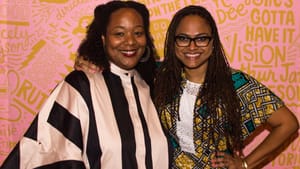Stay in the Loop
BSR publishes on a weekly schedule, with an email newsletter every Wednesday and Thursday morning. There’s no paywall, and subscribing is always free.
Celebrating black films with Ava DuVernay
BlackStar Film Festival presents Ava DuVernay with Maori Karmael Holmes

Oscar-nominated director Ava DuVernay’s steady crawl to the top of the film industry has been just as defiant as her intrepid approach to filmmaking. Because of that, she was the perfect industry leader to provide words of wisdom and several laughs to hungry filmmakers and film enthusiasts at the Sixth Annual Blackstar Film Festival, in conversation with festival founder Maori Karmael Holmes.
Filmmaking isn’t sexy
In many ways, DuVernay approached her foray into film with a refusal to bend to Hollywood’s narrow view of what black filmmakers are and should be. While running her own PR agency for Hollywood filmmakers, she picked up a camera at the ripe age of 32, propelled by a desire to tell the stories of her people and not just to help other filmmakers share their own.
“I did not go into filmmaking thinking it was going to be anything sexy,” she said. “I just had stories that I wanted to tell. . . . I thought maybe I could write something and make something on the weekend that could maybe be in a festival. That’s how I started making films. I just wanted people to see my films. I didn’t want to be anything else. . . . I just wanted to create a story and share it with some black folk. That was my drive at the time.”
The stories of her people
DuVernay’s yearning to tell personal and culturally rich stories laced with honest portrayals of African Americans makes her a dynamic director whose voice and vision have crafted important works such as Selma (2015) and 13th (2016). Selma is the raw retelling of Dr. Martin Luther King’s epic march from Selma to Montgomery, Alabama, in a struggle to win blacks the right to vote. Her documentary 13th audaciously excavates the 13th Amendment and its link to racial inequality in the U.S. prison system. DuVernay explained that her passion to tell stories centered on social-justice issues was spurred by her childhood experiences.
“Growing up in Compton I saw a lot of things that weren’t right,” DuVernay said. “I wanted to find a way to be better — do better. My Aunt Denise . . . embedded in me a sense of social justice with art. She would take me to Amnesty International concerts and got me listening to U2. I remember the first time I listened to Pride (In the Name of Love) and I saw this white man [Bono] from Ireland talking about Dr. King in that song. There was a power in that. For me, art and activism got solidified. I was activated by the injustices in the world around me and it stuck with me.”
The social, political, and cultural inequalities that people of color face prompted DuVernay to be a fervent advocate for independent black filmmakers, and it’s why DuVernay was honored by BlackStar with the 2017 Richard Nichols Luminary Award. In addition to making several independent works herself, including Venus Vs, This Is the Life, I Will Follow, and Middle of Nowhere (which earned her the 2012 Sundance Film Festival’s Best Director prize), she also distributes the films of people of color and woman directors through her film collective, ARRAY.
Hopping planets
DuVernay’s quest to amplify the black community is never far from any project she touches. Even her upcoming Disney adaptation of Madeleine L’Engle’s novel A Wrinkle in Time (she is the first black female director to helm a $100 million film) seems to be a fantastic battle cry for minority girls and boys to continue to fight for what is right and beautiful in the world.
“I made this film for everyone to be able to see this brown girl as the hero of the whole universe,” she said. “It’s not America, it’s not Earth, or the world — this little sister is hopping planets and flying in jeans and a t-shirt. She doesn’t have superpowers, she’s just herself, and she’s able to harness the goodness of herself . . . to overpower darkness.”
What, When, Where
Ava DuVernay in Conversation with Maori Karmael Holmes. BlackStar Film Festival. August 5, 2017, at the Lightbox Film Center, 3701 Chestnut Street, Philadelphia. (267) 603-2755 or blackstarfest.org.
Sign up for our newsletter
All of the week's new articles, all in one place. Sign up for the free weekly BSR newsletters, and don't miss a conversation.

 Jarreau Freeman
Jarreau Freeman